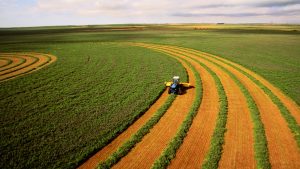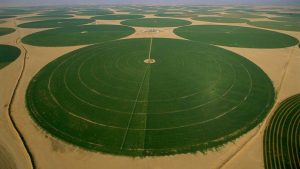Food Security and Corporate Farming in Gulf Countries
The concept of corporate farming revolves around fostering of efficiency as compared to traditional peasant farming prevalent in many third world countries .The corporate approach to farming encourages , institutionalises and induces private sector investment in agriculture with resultantly higher output, income and even exports after reasonable self sufficiency in staple crops is achieved .In Pakistan ensuring of food security should be a priority in the context of its booming population and shrinking acreage and water availability .As per the Food and Agriculture Organisation of the United Nations (FAO) out of the total area of 79.6 million hectares 22.1 million hectares are cultivated and the rest of the territory is comprised of culturable waste, densely populated forests and rangelands. The cropped area constitutes 23.3 million hectares while forests cover 4.6 million hectares of the total land. The country has the world’s largest contiguous irrigation system with almost 80 % of the cultivated area irrigated. So far so good.
Pakistan is amongst the world’s top ten producers of wheat, cotton, sugarcane, mango, dates besides other agriculture produce and ranked 10th in rice production. The majority of its total population of around 220 million inhabits rural areas.In Pakistan the agriculture sector contributes 21 % to the GDP and employs 44 % of the labor force besides generating opportunities in agri business.The largest province of Pakistan although sparsely populated can witness an increase in cultivable area by 100 % if the irrigation network is strengthened and vast swatches of Baluchistan can become green.The success of the United Arab Emirates (UAE) and the Kingdom of Saudi Arabia (KSA) bear testimony to the fact that deserts can bloom.
 Credit Arabian Gulf Business Insight
Credit Arabian Gulf Business Insight
Corporate Farming Ordinance in Pakistan
Initiatives of corporate farming in the past had been shot down due to political bickering .In Pakistan the Corporate Farming Ordinance 2001 was promulgated under which companies listed on the country’s bourse could lease land in the country for 99 years split into periods of 50 and 49 years. In the year 2001-2002 the Government of Pakistan announced a policy package to introduce Corporate Agriculture Farming https://bboit.gob.pk/wp-content/uploads/2021/02/CORPORATE-FARMING.pdf. The Government had then identified 9.14 million acres of state land for leasing to different corporations however the policy was consigned to dusty shelves. Neighbouring desert countries despite being awash with petro dollar revenues had better foresight and diversified their economies while we rue in hindsight.Complacency has set in.
 Credit CNBC
Credit CNBC
Saudi & UAE Agri Ensure Food Sovereignty & Food Security
UAE policy makers understood that it needed to embrace change on its agricultural horizon as it currently imports 90% of foodstuff. Saudi Arabia’s agricultural development over the last three decades has remained phenomenal and enviable for countries like Pakistan ,especially when viewed in the context of a country with one of the lowest rainfall rates in the world , and it managed to convert swathes of its desert into agricultural fields . Saudi Arabia boasts of exporting wheat, dates, dairy products, eggs, fish, poultry, fruits, vegetables and flowers to regional markets . Dates once considered its staple diet are now a largesse of its global humanitarian aid paralleled to none but the US.
 Credit Marco Polis
Credit Marco Polis
KSA’s experts and think tanks in the last four decades diligently established a network of dams to trap and utilise precious seasonal flood waters and built huge underground water reservoirs and identified and replenished aquifers . The Kingdom of Saudi Arabia has 27 desalination plants producing fresh water from saline and brackish water for urban and industrial use thereby dedicating available water reservoirs for agriculture.
Gulf countries Scoop up Agricultural Lands
In its quest for food security the Gulf countries began scooping up farmland in drought afflicted regions of the U.S. Southwest much to the resentment and chagrin of the farming communities in the US. After it banned production of Alfalfa in the year 2016 considering it a drain on its precious water resources the KSA policy makers cleverly acquired 15,000 acres of irrigated land in the US state of California . Almarai a Saudi based company through a subsidiary owns 15,000 acres in a farming town called Blythe at a four hours drive from Los Angeles .Bales of Alfalfa , a perennial flowering plant which is water intensive , is used as fodder for almost 94,000 dairy cows in KSA and the bales are transported from the US to Saudi Arabia by sea.The Palo Verde Irrigation District charges overhead for water at the flat low rate of $ 77/acre annually.The kingdom has established grain silos at its seaports and downstream for strategic storage.
The investment of Gulf countries extends to Africa and in a short period from the year 2016 to 2021 Gulf companies invested around $ 1.2 billion in sub-Saharan Africa . The proportion of investment is largely from UAE , Saudi Arabia, Qatar and Kuwait. Saudi Arabia has exclusively acquired around two million hectares in Africa. The Abu Dhabi Fund for Development has remained integral to UAE’s agri based investment in Africa with a financial portfolio valued at $ 16 billion spanning 28 African states .
Pakistan Lacks an Adequate Digital Repository
Compounding the problems of the agricultural sector in Pakistan are issues of antiquity of markets, lack of unification in public policy , stereotyped research ,timely availability of credit, enhancing the capabilities of the labor force, lack of digitalisation of data, non affordable prices of inputs such as fertilisers and seeds and distribution of water and a skewered pattern of landholdings. State owned corporates such as fertiliser manufacturers in Pakistan should diversify portfolios and be innovative enough to mesh state run banks, promote federal and provincial ministerial and institutional access , goad missions abroad to tap into fiscal resources of desert kingdoms on reciprocity , acquire estate on long term lease for corporate farming ,maintain a digital repository of skilled and trained manpower and muster academia of universities operating on scientific lines all under one umbrella.
By Nadir Mumtaz

Very Informative 👏